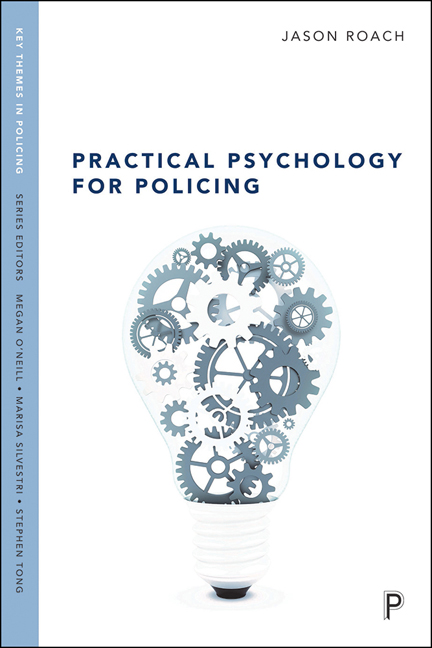Book contents
- Frontmatter
- Dedication
- Contents
- Series preface
- List of figures, tables, and boxes
- Acknowledgements
- 1 Introduction (or unleashing the kraken)
- 2 Psychology and policing: welcome bedfellows?
- 3 Human and police decision-making
- 4 Challenging common police perceptions of career criminals and serious offenders
- 5 Self-Selection Policing
- 6 Psychology, expertise, and improving police officer street-craft
- 7 Psychology and crime prevention
- 8 Psychology and police wellbeing
- 9 Psychology and policing: taking stock and where do we go from here?
- Notes
- References
- Index
8 - Psychology and police wellbeing
Published online by Cambridge University Press: 17 January 2024
- Frontmatter
- Dedication
- Contents
- Series preface
- List of figures, tables, and boxes
- Acknowledgements
- 1 Introduction (or unleashing the kraken)
- 2 Psychology and policing: welcome bedfellows?
- 3 Human and police decision-making
- 4 Challenging common police perceptions of career criminals and serious offenders
- 5 Self-Selection Policing
- 6 Psychology, expertise, and improving police officer street-craft
- 7 Psychology and crime prevention
- 8 Psychology and police wellbeing
- 9 Psychology and policing: taking stock and where do we go from here?
- Notes
- References
- Index
Summary
Introduction
One of the most obvious spaces where psychology and policing interact is the issue of maintaining police and police staff wellbeing. Attending dangerous and/or emotionally charged situations, for example, is often part and parcel of policing, with many police exposed to ever-changing cocktails of risky and potentially traumatic events, on a daily basis. Put simply, ‘it comes with the job’. This raises two primary questions for this chapter:
1. how can knowledge gleaned from psychological research help us to identify the common pressures and stressors on the wellbeing of those working in policing (for example, emotional, psychological, and physical effects); and
2. how can this be best translated into appropriate support to help those working in policing maintain a good level of personal wellbeing?
What appears unfathomable, at least until relatively recently, has been the lack of academic research on police wellbeing, despite the unequivocal acceptance that policing is (1) often a dangerous, risky, challenging, and difficult arena within which to work, and therefore (2) those who do so are exposed to potentially traumatic and emotionally charged events on a daily basis. Despite the formal creation of police services in the UK some 200 years ago, it is only in the last few years that police wellbeing has become a popular focus for academic research. Indeed, research in this area is still at best considered to be ‘emergent’. In terms of information and wellbeing support guidance and support available to UK police and police staff, the Oscar Kilo (OK) website developed and maintained by the National Police Wellbeing Service is a shining beacon.
To date, most of the research literature pertaining to the effects on police staff has tended to focus on ‘front-line’ policing (that is, more on ‘mainstream policing functions’, such as street patrols), perhaps failing to recognise that modern policing is an occupation comprising thousands of different roles, situations, contexts, and responsibilities (Cartwright and Roach, 2021b). As a defence, as with anything else, the research had to start somewhere, and until recently it could be argued that consequently the wellbeing challenges and needs of police and police staff involved in very different policing roles and functions has been overlooked at the expense of a generalisation on ‘policing’ as a homogenous phenomenon.
- Type
- Chapter
- Information
- Practical Psychology for Policing , pp. 93 - 107Publisher: Bristol University PressPrint publication year: 2023

